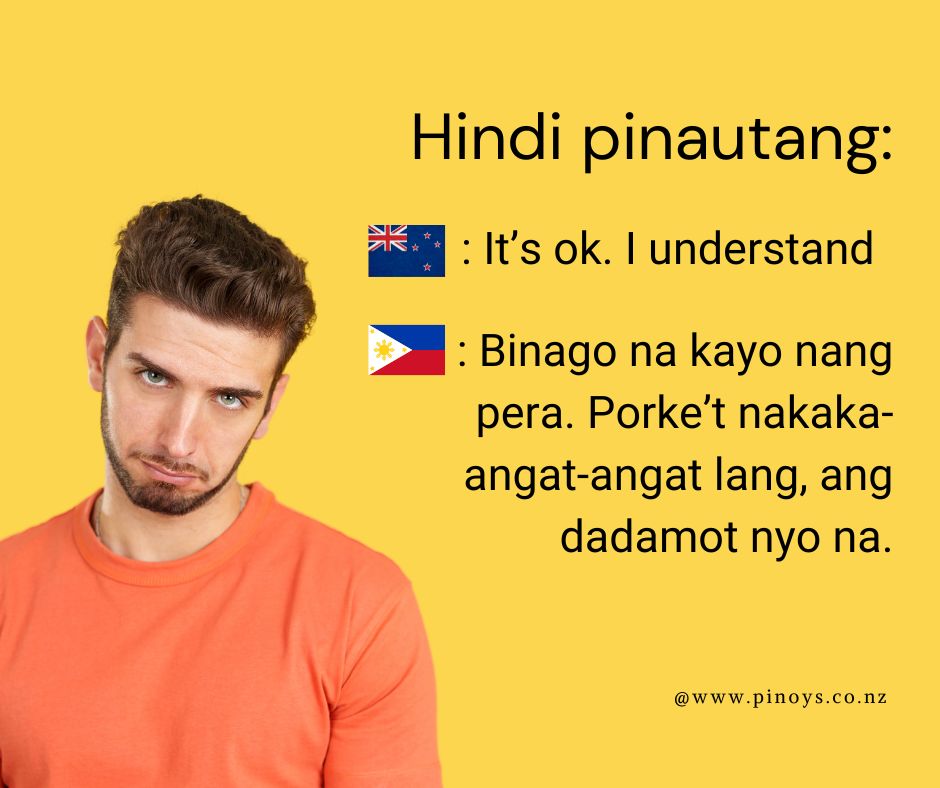In the age of social media, humor often reveals deeper truths about societal norms and expectations. A post circulating recently on Pinoys in NZ Facebook Group captures a conversation that hits home for many Overseas Filipino Workers (OFWs). The simple exchange between a Filipino in New Zealand and one in the Philippines opens a window into the complex world of familial and social dynamics faced by OFWs. Let’s unpack the layers of meaning behind this comic and explore the broader implications for our society.
The Burden of Expectations
For many Filipinos, going abroad represents the ultimate dream—a pathway to better opportunities and financial stability. However, this dream often comes with a heavy price. OFWs are not just workers abroad; they are lifelines to families back home. The expectation to send money, support extended family members, and provide financial aid during emergencies is immense.
The posts dialogue highlights a common scenario: an OFW is asked for financial help but is unable to provide it. The response from a ‘friend’, “Binago na kayo nang pera. Porke’t nakaka angat-angat lang, ang dadamot nyo na,” is a harsh judgment. It suggests that the OFW has changed, becoming stingy now that they are financially better off.
This expectation that OFWs must always be ready and able to help can create significant stress. It assumes that because they are abroad, they have limitless resources. Yet, many OFWs face their own financial challenges, from high living costs in their host countries to the debt incurred to get there.
The Reality of Life Abroad
Life abroad is often romanticized, but the reality can be starkly different. Adjusting to a new culture, dealing with homesickness, and facing discrimination are common experiences. The post sheds light on the need for empathy and understanding from those back home. OFWs may not always be able to meet financial demands, and this does not reflect a lack of love or generosity. Rather, it underscores the importance of recognizing the sacrifices and struggles they endure daily.
That’s why Pinoys in NZ partnered with a trusted Kababayan, who is committed to helping fellow Overseas Filipino Workers (OFWs) secure additional funds tailored to their unique circumstances and needs. With his extensive experience and deep understanding of the challenges faced by OFWs, he provides personalized financial solutions that empower our community abroad. His dedication to uplifting the lives of our kababayans ensures that they receive the support and guidance necessary to achieve financial stability and success.

Book a consultation here: https://www.pinzmarketing.com/financialloans
Fostering Mutual Understanding
What can we learn from this viral post? First, it’s crucial to foster mutual understanding and compassion. Families and friends in the Philippines should strive to see beyond the financial support that OFWs provide. Emotional support and appreciation for their hard work and sacrifices are equally important.
Secondly, there needs to be a shift in societal attitudes. Financial success abroad should not be met with resentment or unreasonable demands but with pride and support. Communities should celebrate the achievements of OFWs without imposing unrealistic expectations.
Lastly, it’s essential for OFWs to communicate openly with their families about their financial situations and challenges. Transparency can help manage expectations and reduce the pressure to meet impossible standards.
The comic post, “Nakapag-abroad ka lang, ang yabang mo na,” is more than just a humorous take on a common situation; it is a poignant reminder of the complex web of expectations and realities faced by OFWs. As a society, we must work towards greater empathy, support, and understanding for our modern-day heroes who toil abroad, not just for themselves, but for their loved ones and their country. Let’s strive to replace judgment with compassion and recognize the shared humanity in each of our experiences.



